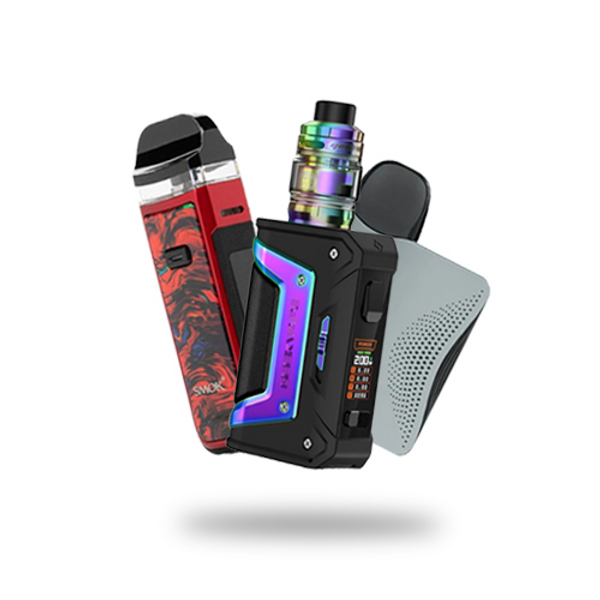With the rise of smoke-free nicotine alternatives, many Americans are asking a crucial question: are nicotine pouches safer than vapes? As health-conscious consumers seek less harmful alternatives to traditional cigarettes, understanding the safety profiles of these modern nicotine delivery systems becomes essential. This comprehensive review examines the evidence to help you make an informed decision about these increasingly popular products.
Understanding Nicotine Pouches and Vaping
What Are Nicotine Pouches?
Nicotine pouches are small, tobacco-free pouches containing nicotine, flavorings, and other ingredients. Users place these discrete white pouches between their lip and gum, where nicotine absorbs through the mouth's mucous membranes. Popular brands like ZYN have gained significant traction in the American market, offering a smoke-free and spit-free nicotine experience.
What Is Vaping?
Vaping involves using electronic cigarettes (e-cigarettes) that heat a liquid containing nicotine, flavorings, and other chemicals to create an inhalable vapor. Unlike traditional cigarettes, vaping doesn't involve combustion, but users still inhale the resulting aerosol into their lungs.
Safety Comparison: The Key Differences
Lung Health Impact
| Aspect | Nicotine Pouches | Vaping |
|---|---|---|
| Lung exposure | No direct lung contact | Direct inhalation into lungs |
| Respiratory irritation | Minimal to none | Potential for lung irritation |
| Vapor/smoke production | None | Produces aerosol vapor |
| Breathing pathway | Oral absorption only | Pulmonary absorption |
The most significant safety advantage of nicotine pouches over vaping lies in lung protection. ZYN pouches are generally safer, making them better than vaping. They contain no tobacco, produce no smoke or vapor, and do not harm the lungs. This fundamental difference means your respiratory system remains unaffected when using pouches.

Chemical Composition and Ingredients
Nicotine pouches typically contain:
- Pharmaceutical-grade nicotine
- Plant-based cellulose fibers
- Food-grade flavorings
- pH adjusters and stabilizers
Vaping liquids contain:
- Nicotine (various concentrations)
- Propylene glycol and vegetable glycerin
- Flavorings (often more complex chemical compounds)
- Additional additives and preservatives
Nicotine pouches (and vapes, or e-cigarettes) don't have tobacco, so they may carry less risk of cancer than traditional cigarettes. However, the simpler ingredient profile of pouches may present fewer unknown health risks compared to the complex chemical interactions in vaping liquids.
Absorption Methods and Body Impact
Nicotine Pouches: Oral Absorption
- Slower, steadier nicotine release
- Absorption through oral mucous membranes
- No impact on lung tissue
- More controlled nicotine delivery
Vaping: Pulmonary Absorption
- Rapid nicotine delivery to bloodstream
- Requires healthy lung function for optimal absorption
- Potential for lung tissue irritation
- Higher peak nicotine levels
FDA Regulation and Scientific Evidence
Current Regulatory Status
The US Food and Drug Administration (FDA) recently authorized the marketing of 20 ZYN nicotine pouch products, the first of their kind to receive such approval. This regulatory milestone represents a significant step forward for pouch safety validation.
In contrast, The U.S. Food and Drug Administration (FDA) has not approved nicotine pouches as a smoking cessation aid, though some products have received marketing authorization after rigorous scientific review.
Scientific Research Findings
| Research Area | Nicotine Pouches | Vaping |
|---|---|---|
| Long-term studies | Limited but growing | More extensive, mixed results |
| Cancer risk | Lower theoretical risk | Reduced vs. smoking, still being studied |
| Addiction potential | Present but potentially lower | High addiction potential |
| Youth appeal | Growing concern | Established youth usage problem |
FDA has authorized 20 nicotine pouch products. These products have undergone rigorous scientific review, including toxicologic assessments, and have been found by FDA to meet the statutory public health standard.
Health Benefits and Risks
Advantages of Nicotine Pouches
- No lung involvement: The most significant safety benefit
- Discrete usage: No visible vapor or odor
- Controlled dosing: Consistent nicotine delivery
- Reduced chemical exposure: Simpler ingredient profiles
- Social acceptability: Can be used in smoke-free environments
Potential Risks of Nicotine Pouches
- Oral health concerns: Possible gum irritation
- Nicotine addiction: Still contains addictive nicotine
- Limited research: Newer product category with evolving safety data
- Gateway concerns: Potential introduction to nicotine use
Side effects of use can include irritation of the gums, sore mouth, hiccups, nausea and most importantly, nicotine addiction which increases relapse risk with other tobacco products.
Vaping Risks
- Lung health concerns: Potential respiratory irritation
- Unknown long-term effects: Relatively new product category
- Complex chemical interactions: Multiple ingredients with unknown interactions
- Device-related risks: Battery issues, heating element concerns
User Experience and Lifestyle Factors
Convenience and Discretion
Nicotine pouches offer superior discretion. Unlike cigarettes and vaping devices, which produce smoke and vapor, nicotine pouches are more discreet and, therefore, harder for parents to notice. This discretion makes them more socially acceptable in various settings.
Social and Environmental Impact
Nicotine pouches produce:
- No secondhand exposure risks
- No environmental vapor
- Minimal waste (small pouches)
- No fire risk
Vaping considerations:
- Visible vapor production
- Potential secondhand exposure concerns
- Device maintenance requirements
- Battery and electronic waste
Special Considerations for Different Populations
Youth and Adolescents
Both products pose concerning risks for young people. There is a significant risk that nicotine pouch use could become a similar problem, particularly if young vape users switch to these products as regulatory changes affect vaping access.
Pregnant Women
Neither nicotine pouches nor vaping should be used during pregnancy. Nicotine itself poses developmental risks regardless of delivery method.
People with Respiratory Conditions
For individuals with asthma, COPD, or other breathing difficulties, nicotine pouches present a clear advantage by avoiding lung involvement entirely.
Making the Right Choice for You
When Nicotine Pouches Might Be Better
- You want to avoid lung exposure
- You need discrete nicotine delivery
- You have respiratory sensitivities
- You prefer consistent, controlled dosing
- You want minimal environmental impact
Factors to Consider
- Your health history: Respiratory conditions favor pouches
- Lifestyle needs: Discretion requirements
- Nicotine goals: Cessation vs. maintenance
- Social environment: Workplace and home considerations
Expert Opinions and Medical Perspectives
University Health Center medical experts and Nebraska Medicine certified tobacco treatment specialist Jill Selzle, PA, do not recommend these products as cessation aids, emphasizing that neither option is completely risk-free.
However, FDA officials noted that the pouches have the potential to help people quit smoking or stop using tobacco products. The pouches also contain lower nicotine doses — Zyn sells them at 3 milligrams and 6 milligrams — and fewer harmful components than other products, so they "pose lower risk" compared to traditional tobacco products.
The Bottom Line: A Clear Safety Advantage
Based on current evidence and expert analysis, nicotine pouches appear to be safer than vapes for most adult users. The primary safety advantage lies in lung protection – by avoiding inhalation entirely, pouches eliminate respiratory risks associated with vaping.
Key safety benefits of nicotine pouches include:
- No lung tissue exposure
- Simpler chemical composition
- FDA authorization for some products
- Reduced secondhand exposure risks
- Greater social acceptability
However, it's crucial to remember that both options carry risks, primarily related to nicotine addiction. Neither product should be considered completely safe, and both are inappropriate for non-nicotine users, pregnant women, and minors.
Frequently Asked Questions
Are nicotine pouches FDA approved?
The FDA has authorized marketing of 20 ZYN nicotine pouch products after rigorous scientific review, though they haven't approved pouches specifically as smoking cessation aids.
Do nicotine pouches cause cancer?
Nicotine pouches don't have tobacco, so they may carry less risk of cancer than traditional cigarettes. However, long-term cancer risk studies are still limited.
Can nicotine pouches help me quit smoking?
While some users report success, there is no data to show nicotine pouches as a safe or effective way to quit according to medical experts. Consult healthcare providers for evidence-based cessation methods.
Are nicotine pouches addictive?
Yes, nicotine pouches contain nicotine, which is addictive regardless of delivery method. Nicotine addiction increases relapse risk with other tobacco products.
What are the side effects of nicotine pouches?
Common side effects include gum irritation, mouth soreness, hiccups, and nausea. Most effects are mild and temporary.
How do nicotine pouches compare to cigarettes?
Both nicotine pouches and vaping are significantly safer alternatives to traditional cigarettes, which involve combustion and produce thousands of harmful chemicals.
Should I switch from vaping to nicotine pouches?
If you currently vape and want to reduce lung-related risks, nicotine pouches offer a potentially safer alternative. However, the best choice is complete nicotine cessation under medical guidance.
Are there any long-term studies on nicotine pouches?
Long-term research is limited due to their recent market introduction. Current studies show promising switching rates from traditional tobacco products, but more research is needed for comprehensive long-term safety data.
The information in this article is for educational purposes only and should not replace professional medical advice. Consult your healthcare provider before starting or stopping any nicotine product.
 US Dollar
US Dollar
 Australian Dollar
Australian Dollar
 Canadian Dollar
Canadian Dollar






